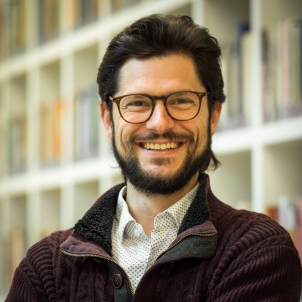Hanno on working on a thesis
Name: Hanno Müller
Department: Center for Language Studies: Speech Production and Comprehension
Research: Dutch morphologically complex words: The role of morphology in speech production and comprehension
Started at the IMPRS: 2019
Nationality: German
How did you come to pursuing your research topic in Nijmegen?
When I was 14, I wrote rap songs. I loved to play with language. My passion for language grew and led me to study Linguistics and Cognitive Science. In my master's thesis, I compiled a corpus of newspaper articles from three different dailies that reported on the 2013 Ghouta chemical attack. Using complex statistical techniques, I worked out how possible perpetrators of the chemical attacks were addressed in each newspaper. That's when I found out the great potential of computational modeling techniques to answer linguistic questions. and when I came to realise that it was important for me to make a scientifically valuable contribution. I decided that I would like to learn from Europe finest linguists, which led me to Radboud University.
What are some of the highlights of your doctoral life so far?
A highlight for me has been the Donders Neuroimaging Toolkit. In an intensive weeklong event, biologists, physicists, neurologists and linguists introduced us to brain research methods. Via an underground tunnel, we reached the research facilities under the hospital, where researchers examine the brains of living mice through a glass plate in the skull. That's when I felt: This is science.
In addition, I benefit immensely from the research group at the Heinrich Heine University of Düsseldorf with which I am associated. The research group has enabled me to come into contact with leading scientists in my field of research. The feedback from other experts constitutes an indispensable element of my research.
To enjoy working on a doctoral thesis, you need both: the lively urge to bring findings to light and the discipline to carry out the necessary steps.
What advice do you have for peers or those considering doctoral studies?
Science is passion. At least that's what I thought when I started my PhD training in Nijmegen. I quickly discovered that science is often a back-breaking job. To enjoy working on a doctoral thesis, you need both: the lively urge to bring findings to light and the discipline to carry out the necessary steps. The only way to find out if a doctoral position is for you is to try it out.


Share this page